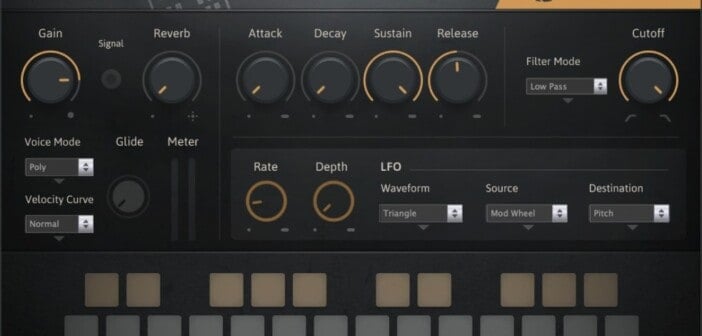MonsterDAW releases Monster Bass, a freeware bass ROMpler in VST and AU plugin formats for Windows and macOS.
Bass is one of those things that can make or break a track. It’s where a lot of producers start, even non-electronic ones. But you can also fall into the trap of looking for the right sound and get stuck just doing that for hours.
That’s where stuff like MonsterDAW’s new Monster Bass plugin comes in VERY useful. Think of it as “bass on demand.”
It’s a full-featured, great-looking plugin that works excellent as a track starter but also has the grit to make it to the final track if you like how it sounds.
Monster Bass comes with 25 diverse presets, from electronic to cinematic, and they all sound pretty great. Most of them are very intense, and I can totally see them making their way into a wide variety of tracks, provided they’re programmed well.
Whether you’re a soundtrack composer, an EDM artist, or a beatmaker, you’re sure to find some good bass sounds here.
Monster Bass is not a synthesizer but a ROMpler, similar to something like reFX’s Nexus. That’s precisely where its power and ease of use come in.
ROMplers are consistently underappreciated in music production circles, even being considered “not serious enough,” as if your listener is going to tell that you used that homebrew modular FM synth that only triggers once you do 20 handstand pushups.
I have to be honest, I started out this review also treating Monster Bass starter and not as something to be used on its own, but I’m growing more convinced that it’s worth a lot more than that.
It has built-in saturation (labeled Gain), Reverb, an ADSR envelope, different filter types, voice modes, and velocity curves. If that’s not enough, it even has an LFO for when you need to score a drunk heist!
The GUI is straightforward to read, and the overall workflow is absolutely perfect.
And hey, once you’ve used it to start a track, you might get the urge to use something “more pro” on that same bassline, but I’d argue that Monster Bass definitely delivers that final track sound.
Honestly, just throw it on a track and see where it takes you. Right now, I’d say it’s one of the better freeware bass options out there. Very impressed!
While you’re at it, why not check some of MonsterDAW’s other plugins? The dude’s a legend, and he has plugins for keys, drums, folk instruments, and more – all free! Tell him BPB sent you.
More info: Monster Bass (32-bit and 64-bit VST/AU plugin formats for Windows & macOS)
More articles:



6 Comments
Adam
onNo, no aaaand no. No rompler can let your creative flow become everyday basis.If you learn how to create certain sounds there are pointless. Invest in your education (even time) instead of going stupid shortcuts that bring you nothing. So no once again.
Emanuil Spasov
onI agree with you – to a point. I personally think it’s more important to have something you’re proud of before you get to the point where you can have something you’ve completely mastered.
I made the most music when I was just starting out. It wasn’t necessarily my best work, but I made it, and I think that’s something that gets brushed to the side when discussing production.
Picking up lessons – while super important – is also somewhat unavoidable in making music. But a lot of the time beginners and even intermediates get obsessed with knowing how subtractive synths work, how FM synths work, how additive synths work, how this and that type of compression works, how EQ works, how this other guy says EQ works – and get sidetracked from actually making music.
Using something like a rompler is a great way to get to know what sounds you like. This plugin, in particular, could also teach you how to use an ADSR envelope, what different types of filters do, how much reverb you like on a bass.
Also, most of us already use drum and vocal samples. I personally enjoy using synth samples too, just because it’s sometimes more fun for me to manipulate audio than to do sound design in a synth. Not always, but sometimes.
I’m 100% “for” being skilled and informed when making music, but there is something to be said about having something to show for it while you’re doing it. One thing about shortcuts is that, if you’re serious about it, they get boring after a while. And then you’re free to move on and go, “hmm, how DO I do that thing I like doing but don’t know how to do.”
Just my two cents.
Tomislav Zlatic
onSame here, I made (finished) a lot more music in my first few years of music production. It could be due to a number of reasons, but an important one is that I had fewer plugins back then. I find that my “musical productivity” drops as the number of options (plugins, presets, samples, etc.) increases.
So, having a ROMpler for bass sounds isn’t such a bad thing in my opinion.
Monty
onLearn how to play a REAL bass….
Hasan Hasan
onMy antivirus swears!
Wing Yee
onLoved it at first play. Indeed this rompler is one of the better ones out there!